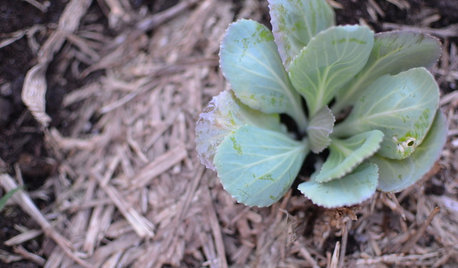Anyone use JUST actively aerated compost? tea?
herbal
11 years ago
Related Stories

GARDENING GUIDESGet on a Composting Kick (Hello, Free Fertilizer!)
Quit shelling out for pricey substitutes that aren’t even as good. Here’s how to give your soil the best while lightening your trash load
Full Story
BUDGET DECORATINGThe Cure for Houzz Envy: Living Room Touches Anyone Can Do
Spiff up your living room with very little effort or expense, using ideas borrowed from covetable ones
Full Story
LIFE8 Sick-Day Activities to Get Healthy at Home
Staying home is the fastest way to heal — and to enjoy all the comforts and design details you've spent so much time choosing
Full Story
KITCHEN SINKSJust a Touch: Faucets Without the Fuss
Faucets that turn on with a tap of the finger, forearm or hand are great for messy hands or full arms
Full Story
FEEL-GOOD HOMEHow to Carve Out a Corner Just for You
You may not have an entire room where you can get away for meditation or a catnap, but a retreat is still within reach
Full Story
DECORATING GUIDESRevive Your Room’s Look in Just 5 Steps
Not in total-makeover mode? Give your space polish and a pulled-together look with this easily doable plan
Full Story
REGIONAL GARDEN GUIDESMid-Atlantic Gardener's September Checklist
Squash, anyone? Cool-season veggies are suiting up for the garden, while summer's last blooms are winding down
Full Story
GARDENING GUIDESHouzz TV: Make a Worm Bin for Rich Soil and Happy Plants
A worm-powered compost bin that can fit under a sink turns food scraps into a powerful amendment for your garden. Here’s how to make one
Full Story
GARDENING GUIDESCalifornia Gardener: What to Do in July
Active green thumb or not, top priorities for peak fruit and veggie season: watering, feeding, keeping up with growth
Full Story
EARTH DAYThe Case for Losing the Traditional Lawn
Work less, help the environment and foster connections by just saying no to typical turf
Full StoryMore Discussions







nc_crn
Kimmsr
Related Professionals
Fitchburg Landscape Architects & Landscape Designers · Salem Landscape Architects & Landscape Designers · Salem Landscape Contractors · Coeur d'Alene Landscape Contractors · Fort Atkinson Landscape Contractors · Middleton Landscape Contractors · Sun City Center Landscape Contractors · Wallingford Landscape Contractors · Cape Coral Decks, Patios & Outdoor Enclosures · Fishers Decks, Patios & Outdoor Enclosures · Lansdale Decks, Patios & Outdoor Enclosures · Portage Decks, Patios & Outdoor Enclosures · Redmond Decks, Patios & Outdoor Enclosures · Urbana Decks, Patios & Outdoor Enclosures · West Hills Decks, Patios & Outdoor Enclosuresjonfrum
nc_crn
dchall_san_antonio
Kimmsr